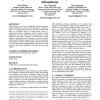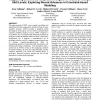2002 search results - page 169 / 401 » Designing Organizations: Towards a Model |
FPLAY
2008
13 years 12 months ago
2008
Conflict theory can be used to explain the interactions between societies during times of turmoil and change (i.e. revolutions, strikes or everyday debates). Games have been produ...
CODES
2007
IEEE
14 years 4 months ago
2007
IEEE
The design and analysis of today’s complex real-time systems requires advanced methods. Due to ever growing functionality, hardware complexity and component interaction, applyin...
GECCO
2005
Springer
14 years 3 months ago
2005
Springer
This article describes a mathematical framework for characterizing cooperativity in complex systems subject to evolutionary pressures. This framework uses three foundational compo...
CHI
2005
ACM
14 years 10 months ago
2005
ACM
This paper presents X-PRT, a new cognitive modeling tool supporting activities ranging from interface design to basic cognitive research. X-PRT provides a graphical model developm...
COMAD
2008
13 years 12 months ago
2008
In designing and developing large complex products, people use models to describe and organize interrelated elements in both product systems (architecture, use cases, constraints....


